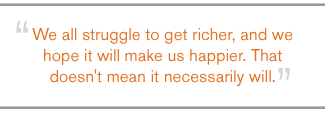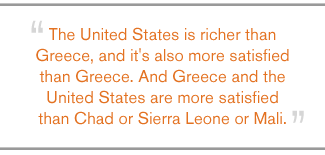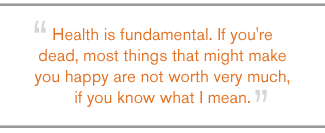Money won't buy you love, you can't take it with you, and loving it is the root of all evil -- or so the sayings go. But some heavy-hitting international economic research indicates that money can buy happiness, or at least a more valued life. So says Angus Deaton, the Dwight D. Eisenhower Professor of International Affairs and Professor of Economics and International Affairs at the Woodrow Wilson School of Public and International Affairs and the Economics Department at Princeton University. Though Dr. Deaton's research focuses on the areas of health, economic development, household behavior, and poverty around the world, he knows a lot about happiness. And he doesn't necessarily approve of it.
 |
It's not that Dr. Deaton doesn't like happiness or believe that people shouldn't be happy; rather, he believes that happiness is not the healthiest goal a society can have -- or perhaps the highest good to which it can aspire. In this provocative conversation, Dr. Deaton explores whether life satisfaction or happiness measures are important or meaningful and whether the pursuit of happiness or wealth matters more to societies than the development of human potential. He also discusses why foreign aid -- both social and financial -- to emerging countries might do more harm than good.
GMJ: Let's start with the big thing: life satisfaction. Is that the same thing as happiness?
Dr. Deaton: That's a big can of worms. The psychologists who investigate these things often think that they get pretty much the same answers when they ask about your life satisfaction as when they ask how happy you are. There's somewhat of an industry trying to figure out what exactly people have in their heads when they answer those questions.
For me, I like to treat the question as just what it says, which is to evaluate your life. The Gallup World Poll also asks questions about enjoyment, and about laughing and smiling, which correspond more closely to what we usually think of as happiness. And it turns out that those are not always the same as life satisfaction, though there is a good deal of overlap. But happiness and life satisfaction are not the same. So let's use satisfaction from now on, but if we think of it as happiness, we will be in good company.
GMJ: That simplifies things. Now to make them complex: How is income related to life satisfaction or happiness?
Deaton: I hope the work I've been doing will change the way people think about that. There's a lot that we just don't understand [about how income relates to satisfaction or to happiness], but the first thing to realize is that they seem to be strongly positively related to one another.
Richer people seem to be happier, or at least they say they're more satisfied with their life, which is what you might expect. We all struggle to get richer, and we hope it will make us happier. That doesn't mean it necessarily will. But the belief in much of the literature is that as countries get richer over time, their populations don't actually get any more satisfied with their lives.
GMJ: Is there a point at which income no longer affects life satisfaction? It's said that after the first $10 million or so, money is just a way of keeping score.
Deaton: I don't think we have much data on the Bill Gateses of this world. One view is that income only really matters when you're really poor. In Sierra Leone, a quarter of all children die before they're five years old. People don't have enough to eat a lot of the time. You would think that because their basic needs are not being met, and they have horrible diseases and worse, a little money surely must make them happier. And that seems to be true.
Some people have argued that once you get beyond that point, once such horrible things aren't happening to you, money doesn't really matter anymore. And that's being claimed by a number of writers, mostly on the grounds that the argument seems plausible, and there's been some evidence for it.
GMJ: But your work suggests that's not true.
Deaton: That's right. I'm not the first person to show, and the Gallup data is particularly clear, that richer countries are not only more satisfied than poor countries, but also more satisfied than somewhat less rich countries. The United States is richer than Greece, and it's also more satisfied than Greece. And Greece and the United States are more satisfied than Chad or Sierra Leone or Mali. [See "Worldwide, Residents of Richer Nations More Satisfied" in the "See Also" area on this page.]
 |
GMJ: What can a happy society accomplish that a less happy one can't?
Deaton: That's a really good question. Maybe nothing. One of the things I'm really interested in is, are these life satisfaction or happiness measures important? Should we care about them? I'm not at all sure that we should.
GMJ: That seems contrary to the Declaration of Independence, which claims for Americans the right to the pursuit of happiness.
Deaton: I grew up in Scotland with a Calvinist upbringing. We were brought up to believe that happiness is a bit wicked. I'm probably trying to discount a cultural prejudice -- you know, I think of happiness as a sort of Timothy Leary taking LSD kind of thing that's probably bad for you. But on a concrete level, I'm very interested in economic development around the world.
So why is it important for Indians or Chadians to get richer? Why do we care about that stuff? Why not just leave them be? I think one of the answers is that happiness is not what really matters; what really matters are people's capabilities and the opportunities that they have before them.
For example, if a mathematical genius or a Mozart dies of some horrible infection in Africa at age five, we've all lost something important. Sometimes, circumstances prevent it from happening. For example, one of the top orthopedic surgeons in New York City is a Ghanaian who was brought in malnourished to a mission hospital in Ghana, and now as a surgeon, he can do things that no one else can do.
If we get these countries so the people in them have more money and their health is better, I'm not sure I really care whether the people are happier or not. It's their ability to function that really matters. Do you see my point?
GMJ: Your point is that the vital thing is the ability to live a good life.
Deaton: Yes, and people can be taught to be happy with and accept things that really aren't very good for them at all, so that happiness, even life satisfaction, is not a very reliable guide. For generations, women accepted a subservient position. I don't think that's a very good thing. And if you'd asked the women then, many of them would have said they were happy with this position. There's the sense that what people tell you about their life satisfaction is not necessarily a very good measure in some circumstances.
GMJ: If you start every morning with a bottle of whiskey and a slice of chocolate cake, you might be pretty happy all day too. But you won't necessarily accomplish anything.
Deaton: That's it. That's what I believe. And the work I did on the Gallup World Poll was partly to see whether life satisfaction measures lined up with the more familiar measures of the quality of people's lives, such as their income, their health, and their political and civil rights. If you look across countries, they line up pretty well in the income dimension -- people in rich countries seem to be more satisfied with their lives. And they line up pretty well in the political dimension too. What's happened in Eastern Europe and the former Soviet Union seems to have made people very unhappy, and that seems perfectly reasonable to me. [See "Toll of Transition in Eastern Europe and Former USSR" in the "See Also" area on this page.]
But the bit that doesn't line up is health. One of the worst epidemics in history, HIV/AIDS, is ravaging Africa, and it doesn't seem to have any effect on people's life satisfaction. So if you think life satisfaction is all there is to life, then we shouldn't worry about AIDS in Africa because it's not making Africans very unhappy. To me, that is an unacceptable position.
GMJ: Considering what you know of health, life expectancy, and life satisfaction, what should donors or wealthy countries focus their philanthropy on? Building economies in poor countries or healthcare? Infrastructure or education?
Deaton: All of those things. Good health, good education, democracy, the ability to purchase goods are all elements of a good life and are important in their own right. It's quite hard to measure them and say which one is most important at any given time. That's supposedly what the political process is about. But I'm not one of the people who believes that you can bypass the need to keep tabs on each of those things by saying as long as people are happy, or satisfied with their lives, then we don't have to worry about those things in and of themselves. Again, people seem to be quite satisfied with their lives even in really bad situations, such as the AIDS epidemic.
The other part is that I believe that the ability to participate in society, having enough purchasing power, and being healthy are important. Health is fundamental. If you're dead, most things that might make you happy are not worth very much, if you know what I mean. And if you're not healthy, it's very hard to earn a decent income. So having income helps you maintain your health, and having health helps you maintain your income. Education is exactly the same sort of thing -- it helps you earn, but it brings you lifelong benefits other than earning.
 |
GMJ: Dr. Deaton, do you see any way of ending poverty in places like Mali?
Deaton: Well, yes and no. But remember, I'm not very sure about this, so I don't want to suggest this is something research has established. But all countries were once as poor as Mali, right? All of the rich countries today were really poor once upon a time. When I was born in Edinburgh in 1945, the infant mortality rate there was higher than it is in India today. Now India is not Mali, but improvements can sometimes happen remarkably quickly. That's not controversial, but it's worth keeping in mind. The harder thing, and I think this probably underlies your question, is what can we do to eliminate poverty in Africa? And I'm not convinced that there's very much that we can do, actually.
That's the bit that's controversial, and I don't know that that's true, but I'm skeptical that much can be done from the outside. The obvious thing to do to relieve poverty [in a given country] is pour money into it, but if the government of the country has little interest in reducing the poverty of its people, you may not be able to do much good that way. The aid money might be diverted to Swiss bank accounts, or food aid could be used by warlords as a weapon to keep their troops fed and prolong a war. The literature from many of the more thoughtful NGO workers who have been on the front lines is often very bitter and skeptical. Even the humanitarian aid process has terrible problems, let alone the attempt to make economies grow by lending money at discounted interest rates.
GMJ: And yet we're morally obligated to do something.
Deaton: Well, there's the Hippocratic oath. You might say that we're morally obligated not to do any harm. And you could argue that attempts to pump money into those countries actually end up doing harm. In Africa, the amount of money readily available to the government is typically very small, and much of it comes from foreign aid. There's very little effort put toward developing domestic talent, so if we pour in money, what talent countries have is going to be distracted by fighting for the aid instead of doing things to develop the country. So when you say, "We have to do something," and that something involves giving money, you might actually be doing harm.
GMJ: Bono doesn't want to hear that.
Deaton: No. He certainly doesn't want to hear that. He's been told often enough, but he won't have anything to do with it. Nor Bill Gates. He's a much more serious figure in this. And there is no doubt good work being done.
GMJ: So how should one help? What can businesses do?
Deaton: One thing I'm sure that we can help with is basic science. For instance, if we were to figure out a vaccine for malaria or figure out what causes HIV/AIDS, it would be a huge gift to Africa. And individuals can do little things. Helping a village build a school, that sort of thing, I think that's probably right.
I think trouble comes from larger scale activities that bring all the bad guys in. Also, those things don't work, and businesspeople do like to see results, don't they?
-- Interviewed by Jennifer Robison